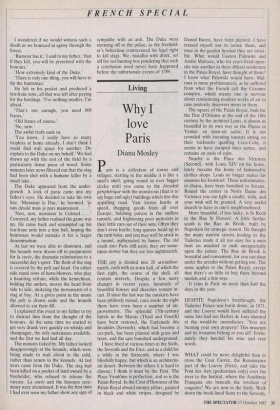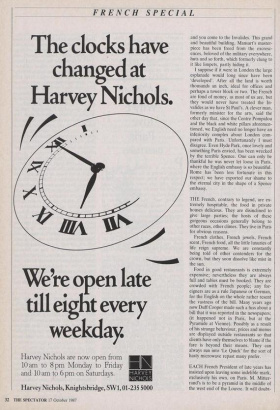Living
Why I love Paris
Diana Mosley
THE city is divided into 20 arrondisse- ments, each with its town hall, of which the first eight, the centre of the shell, all contain marvels. Despite a few nasty changes in recent years, hundreds of beautiful houses and churches remain in- tact. If since the last war the outskirts have been pitilessly ruined, once inside the eight there have even been a number of im- provements. The splendid 17th-century hotels in the Marais (Third and Fourth) have been restored, the Esplanade des Invalides (Seventh), which had become a car-park, has been planted with grass and trees, and the cars banished underground.
I have lived at various times in the Sixth, the Seventh and the First, and as a child for a while in the Sixteenth, where I was blissfully happy, but which is an architectu- ral desert. Between the others it is hard to choose; I think it must be the First. The Place Vendome is perfection, and so is the Palais Royal. In the Cour cl'Honneur of the Palais Royal absurd stumpy pillars, painted in black and white stripes, designed by Daniel Buren, have been planted. I have trained myself not to notice them, and once in the garden beyond they are invisi- ble. What would Gaston Palewski and Andre Malraux, who for years lived oppo- site one another in their official residences in the Palais Royal, have thought of them? I know what Palewski would have; Mal- raux is more problematical, as he suffered from what the French call the Cezanne complex, which means one is nervous about condemning modern works of art in case posterity discovers merit in them.
The square of the Palais Royal, built for the Duc d'Orleans at the end of the 18th century by the architect Louis, is almost as beautiful in its own way as the Piazza in Venice: an open-air salon. It is not crowded with sweating tourists sitting on their rucksacks quaffing Coca-Cola; it seems to have escaped their notice, and remains an oasis of calm.
Nearby is the Place des Victoires (Second), with Louis XIV on his horse, lately become the home of fashionable clothes shops. Louis no longer makes his enemies his footstool. These unfortunates, in chains, have been banished to Sceaux. Round the corner in Notre Dame des Victoires you can light a candle, wish, and your wish will be granted. A very useful church to have in one's neighbourhood.
More beautiful, if less lucky, is St Roch in the Rue St Honore. A little further south is the Rue de Rivoli, built by Napoleon for strategic reason. He thought the many narrow streets leading to the Tuileries made it all too easy for a mob bent on mischief to rush unexpectedly upon the palace. The Rue de Rivoli is beautiful and convenient, for you can shop under the arcades without getting wet. The same applies to the Palais Royal, except that there's so little to buy there beyond medals and a few toys.
It rains in Paris on more than half the days in the year.
DESPITE Napoleon's forethought, the Tuileries Palace was burnt down, in 1871, and the Louvre would have suffered the same fate had not Barbet de Jouy shouted at the would-be incendiaries: 'You are burning your own property! This museum and its treasures belong to you all!' Fortu- nately they heeded his wise and true words.
WHAT could be more delightful than to cross the Cour Carree, the Renaissance part of the Louvre (First), and take the Pont des Arts (pedestrians only) over the river to the Institut, where the Academie Frangaise sits beneath the loveliest of coupoles? We are now in the Sixth. Walk down the book-lined Seine to the Seventh, FRENCH SPECIAL and you come to the Invalides. This grand and beautiful building, Mansart's master- piece has been freed from the excresc- ences, beloved of the military everywhere, huts and so forth, which formerly clung to it like limpets, partly hiding it.
I suppose if it were in London the large esplanade would long since have been 'developed'. After all the land is worth thousands an inch, ideal for offices and perhaps a tower block or two. The French are fond of money, as most of us are, but they would never have treated the In- valides as we have St Paul's. A clever man, formerly minister for the arts, said the other day that, since the Centre Pompidou and the black and white pillars aforemen- tioned, we English need no longer have an inferiority complex about London com- pared with Paris. Unfortunately I must disagree. Even Hyde Park, once lovely and something Paris envied, has been wrecked by the terrible Spence. One can only be thankful he was never let loose in Paris, where the English embassy is so beautiful. Rome has been less fortunate in this respect; we have exported our shame to the eternal city in the shape of a Spence embassy.
THE French, contrary to legend, are ex- tremely hospitable, the food in private houses delicious. They are disinclined to give large parties; the hosts of these gorgeous occasions generally belong to other races, other climes. They live in Paris for obvious reasons.
French clothes, French jewels, French scent, French food, all the little luxuries of life reign supreme. We are constantly being told of other contenders for the crown, but they soon dissolve like mist in the sun.
Food in good restaurants is extremely expensive; nevertheless they are always full and tables must be booked. They are crowded with French people; any for- eigners are as a rule Japanese or German, for the English on the whole rather resent the vastness of the bill. Many years ago now Duff Cooper made such a fuss about a bill that it was reported in the newspapers; (it happened not in Paris, but at the Pyramide at Vienne). Possibly as a result of his strange behaviour, prices and menus are displayed outside restaurants so that clients have only themselves to blame if the fare is beyond their means. They can always run into 'Le Quick' for the sort of hasty microwave repast many prefer.
EACH French President of late years has insisted upon leaving some indelible mark, exclusively his own, on Paris. M. Mitter- rand's is to be a pyramid in the middle of the west end of the Louvre. It will doubt-
FRENCH SPECIAL
less look fairly absurd and out of place, but no pyramid is ugly. I suppose it will quickly become unbearably shabby, like every- thing built now. So far it has only ruined a large part of central Paris, which looks as if some dire disaster — an earthquake, or several hefty bombs — had devastated it. Roads are blocked, gardens turned into mud or dust, and hideous hoardings, scrib- bled on by students, surround the site. This has gone on now not for months but for years. Everyone has got quite accustomed to the inconvenience and mess. As we near the end of President Mitterrand's seven years (or perhaps it might be safer to say his first seven years) there is no sign of the pyramid nearing completion or the rubble being cleared away. If I had a vote, which although I have spent half my long life in France I have not, I should find out what presidential candidates have in mind for the next septennant and cast it for the least Silly project. We must not have another Pompidou, with his 'Centre' at Beaubourg.
IN two years we are to be invited to celebrate the French Revolution. It is worth remembering what Mirabeau said to Chateaubriand: 'I don't wish to have cre- ated only a vast destruction.' Chateaub- riand comments: 'This is, however, what happened. Heaven, to punish us for the misuse of our talents, makes us repent when we succeed.' Mirabeau did not live to see the Terror. 'On the shoulders of the dying Titan sank the mightly orb of France,' in Carlyle's words. Chateaubriand had a glimpse of horrors to come, looking from an upstairs window at a mob surging down the street. Some had pikes with ghastly heads on them, and one thrust his trophy at Chateaubriand's face. He says, had he had a gun, he would have shot the brutal murderer. Fortunately he was un- armed, or we should have lost the author of Memoires d'Outre Tombe. Overcome with disgust, he went home.
Perhaps the celebrations will include a few heads on pikes; the Musee Grevin might oblige. Or will it be a Mass in the Champ de Mars, like the one celebrated by Talleyrand, who although he was a bishop was so unfamiliar with the service that he was concerned lest he might lose the thread, or, worse still, laugh?
WHY do we love Paris? Some people complain that heavily armed police are too much in evidence, but to an old person like me they are very reassuring. Not only for its beauty, its treasures, it museums, its river, do we love it, nor just for the food, the clothes, the shop windows with luxuries beyond our means. It is also loved for what one might call the Atget Paris, markets with displays of fruit and vegetables, old shabby yards, tiny caves where brilliant artisans produce marvels, winding stairs leading to painters' studios with a view over the slated roofs, such as Atget photo- graphed long ago, and which are still to be found. There is infinite variety.
I now live entirely in a suburban house, but at night from my window I see a glow in the sky. It is a reflection from la yille lumiere, and gives me the happy feeling that people are enjoying themselves, as they always have and always will, in Paris.




























































 Previous page
Previous page